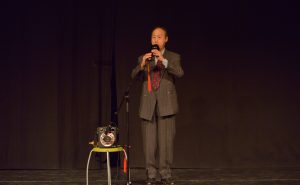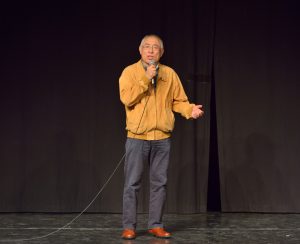At the invitation of Prime Minister Löfven, Prime Minister Modi paid an official visit to Stockholm on 16-17 April 2018.
Prime Minister Modi and Prime Minister Löfven met on 17 April and recalled their Joint Statement issued in Mumbai in 2016, welcomed progress so far on its implementation and reconfirmed their commitment to the Joint Statement as the overall political framework for cooperation.
India and Sweden share values of democracy, rule of law, respect of human rights, pluralism and a rule-based international order. Both Prime Ministers reiterated their commitment to dialogue and cooperation on key international issues of mutual concern, including climate change, Agenda 2030, international peace and security, human rights, gender equality, humanitarian issues, international trade. The Prime Ministers underlined the urgency to step up global efforts to combat climate change, and emphasized their common continued commitment to the Paris Agreement. Both sides agreed to continue security policy dialogue at the level of National Security Advisors, in line with the Joint Statement.
Both Prime Ministers agreed to close cooperation in the UN, and other multilateral fora. They took note of the UN Secretary-General’s reform efforts to ensure a UN fit to support Member States to deliver on Agenda 2030. They also reaffirmed the need for reform of the UN Security Council, including its expansion, to make it more representative, accountable, effective, and responsive to the realities of the 21st century. Prime Minister Modi thanked Prime Minister Löfven for Sweden’s support to India’s candidature for non-permanent membership of United Nations Security Council (2021-22) and for Sweden’s support to India’s permanent membership of a reformed and expanded United Nations Security Council.
Both Prime Ministers expressed their commitment to support and strengthen global export control, non-proliferation and disarmament objectives and looked forward to close cooperation in these areas. Prime Minister Löfven welcomed India’s recent accession to the international export control regimes, including to Australia Group (AG), Wassenaar Arrangement (WA), Missile Technology Control Regime (MTCR), and The Hague Code of Conduct against Ballistic Missile Proliferation (HCOC), and expressed support for India’s membership of the Nuclear Supplier Group (NSG).
Both Prime Ministers called for greater unity and stronger international partnership to counter terrorism, disrupt terrorist networks and financing, and to prevent violent extremism. They emphasized that the global counter terrorism legal framework should be regularly updated to address the changing threat of terrorism with strength, and underscored that any measures taken to counter terrorism comply with international law. In this regard both countries called for an early finalisation of the draft Comprehensive Convention on International Terrorism (CCIT).
To further promote bilateral cooperation, they decided on the following India-Sweden Joint Action Plan, under which India and Sweden, through relevant ministries, agencies and actors, aim to:
Innovation
– Initiate a multi-stake holder Innovation Partnership for a Sustainable Future, underpinning our mutual commitment to drive prosperity and growth and address societal challenges such as climate change and sustainable development through innovation.
– Carry out dialogue and cooperative activities in the field of intellectual property rights under the MoU signed between the Swedish Patent Registration Office and the Department of Industrial Policy and Promotion of India.
Trade and investment
– Encourage trade and facilitate investment in both directions, such as Sweden’s investment in India through ‘Invest India’ and Indian investment in Sweden through ‘Business Sweden’.
– Encourage the work of the India-Sweden Business Leaders Round Table (ISBLRT) to further strengthen India-Sweden business cooperation within inter alia smart cities, digitization, skills development and defence, and to move its relations, ideas, partnerships and recommendations forward.
Smart Cities and Next Generation Transport
– Exchange knowledge and explore cooperation on smart cities, including transit-oriented urban development, air pollution control, waste management, waste-to-energy, waste-water treatment, district cooling and circular economy, including through dialogue and capacity building.
– Exchange know-how and explore cooperation in the areas of electro-mobility as well as renewable fuels.
– Exchange know-how and explore cooperation in the area of railways, such as railway policy development, safety, training and operation and maintenance of railways.
Smart, sustainable and renewable energy
– Engage and seek mutual collaboration on the demonstration and development of smart grid technologies such as smart metering, demand response, power quality management, distribution automation, electric vehicle/charging infrastructure as well as renewable integration, through research, capacity building, policy cooperation and learning on market design prerequisites including business models.
– Expand research, innovation and business cooperation on new innovative energy technologies through the India-Sweden Innovations’ Accelerator, focusing on technologies to utilise renewable energy and energy efficiency.
Women’s skills development and empowerment
– Encourage joint efforts towards women’s empowerment by skilling employment and entrepreneurship opportunities for women through projects such as “Kraftsamla”- a project undertaken by Swedish and Indian actors in Pune, Maharashtra which provides skills training for women in jobs suitable for industry such as forklift drivers, warehouse managers, assembly operators and more.
Defence
– Explore the finalization of a bilateral agreement on exchange and mutual protection of classified information for cooperation in the defence area.
– Enhance Indo-Swedish dialogue on defence cooperation. Proceed with India-Sweden defence seminars in India and Sweden in 2018-19 and explore, together with the ISBLRT, opportunities for investment in Defence Production Corridors in India.
– Encourage industry partners to develop supply chains for small and medium sized enterprises (SME) with major Defence & Aerospace Original Equipment Manufacturers (OEMs).
Space and science
– Acknowledge the importance of bilateral cooperation on space research, technology, innovation and applications. Encourage the space agencies and other space entities to enhance space cooperation under the Memorandum of Understanding, particularly in Earth observation, planetary exploration and satellite ground station activities, through inter alia an Indo-Swedish Space Seminar and a visit by an Indian delegation to Swedish space establishments.
– Explore possible collaboration between the European Spallation Source (ESS), hosted by Sweden, and Indian partners.
Health and Life Sciences
– Enhance collaboration on the priority issues identified in the field of health, such as health research, pharmacovigilance and anti-microbial resistance, under the Memorandum of Understanding in the field of health care and public health.
Follow-up
– The Indo-Swedish Joint Commission on Scientific and Economic Affairs, Foreign Office Consultations and other relevant bilateral fora and Joint Working Groups will oversee the implementation of this Action Plan.
Visit of H.E. Narendra Modi, Prime Minister of India, to Stockholm 16-17 April 2018.
Today in Stockholm, the Prime Minister of India Narendra Modi, the Prime Minister of Denmark Lars Løkke Rasmussen, the Prime Minister of Finland Juha Sipilä, the Prime Minister of Iceland Katrín Jakobsdóttir, the Prime Minister of Norway Erna Solberg and the Prime Minister of Sweden Stefan Löfven held a Summit hosted by the Swedish Prime Minister and the Indian Prime Minister.
During the Summit, the Prime Ministers pledged to deepen cooperation between the Nordic countries and India, and focused their discussions on key issues related to global security, economic growth, innovation and climate change. The Prime Ministers reaffirmed the importance of free trade as a catalyst for achieving inclusive growth and realising the Sustainable Development Goals.
The Prime Ministers acknowledged that innovation and digital transformation drive growth in an interconnected world and underpin a growing engagement between the Nordic countries and India. The role of the Nordic countries as global innovation leaders was underlined. The Nordic approach to innovation systems, characterised by a strong collaboration between public sector, private sector and academia, was discussed, and synergies were identified with India’s rich pool of talent and skills.
The Summit emphasised the Indian Government’s strong commitment to innovation and digital initiatives as key to prosperity and sustainable development, with national flagship programmes such as Make in India, Startup India, Digital India and Clean India. Nordic solutions in clean technologies, maritime solutions, port modernisation, food processing, health, life-sciences and agriculture were mentioned. The Summit welcomed the Nordic Sustainable Cities Project aimed at supporting the Smart Cities Program of the Government of India.
The Prime Ministers noted that the unique strengths of India and the Nordic countries offer immense opportunities for trade and investment diversification and mutually beneficial collaboration. During the talks, the importance of the rules-based multilateral trading system as well as open and inclusive international trade for prosperity and growth was underlined. The Ease of Doing Business practices were emphasised as a priority for both the Nordic countries and India.
The Prime Ministers acknowledged that terrorism and violent extremism are major challenges for the international community. They discussed global security, including cyber security, based upon their shared values of human rights, democracy and the rule of law, and their commitment to uphold the rules-based international system. They also discussed export control and non-proliferation. The Nordic countries welcomed India’s application for membership of the Nuclear Suppliers’ Group and reaffirmed their commitment to work constructively within the Group with the aim of reaching a positive outcome at the earliest opportunity.
The Prime Ministers reaffirmed their support for the United Nations and the Secretary-General’s reform efforts to ensure a UN fit to support Member States to deliver on Agenda 2030 and took note of his proposals to strengthen the UN, including in the areas of development, peace operations, peacebuilding and conflict prevention. The Nordic countries and India reaffirmed the need for reform of the UN Security Council, including its expansion in both permanent and non-permanent seats to make it more representative, accountable, effective and responsive to the realities of the 21st century. The Nordic countries agree that India is a strong candidate for a permanent seat in a reformed Security Council expanded with both permanent and non-permanent members.
The Prime Ministers reaffirmed their full commitment to implementing the 2030 Agenda for sustainable development as well as the ambitious implementation of the Paris Agreement. They agreed to continue efforts to develop cleaner energy systems, renewable energy and fuels, increased energy efficiency and technologies for cleaner energy production. The Prime Ministers noted that women’s full and meaningful participation in political, social and economic life is key to inclusive development and agreed to promote the empowerment of women.
The Prime Ministers agreed that a strong partnership can help spur innovations, economic growth, sustainable solutions and mutually beneficial trade and investments. The Summit emphasized the importance of strong people-to-people contacts through education, culture, labour mobility and tourism – all areas where the Nordic countries and India see a continuous increase in both interests and number。
The governments of Sweden and India hereby agree to deepen our collaboration in the field of innovation through a strategic innovation partnership. The innovation partnership represents a step-change in India-Sweden science and innovation
collaboration, underpinning our mutual commitment to drive prosperity and address global challenges such as climate change and sustainable development through innovation.
The partnership sets the framework for future cooperation to jointly tackle societal challenges including innovation driven challenges on cross sectoral issues with multi-stakeholder/agency participation from both countries. The partnership will cover co-operation across a wide spectrum, from the creation of effective innovation systems to the commercialisation of new technologies. The partnership is based on the principles of co-funding, co-development and co-creation, towards mutual benefits, making full use of our complementary strengths. The partnership will deepen the long and fruitful relations between our countries, building upon the Joint Statement between our Prime Ministers issued in Mumbai 2016 and the Joint Action Plan agreed in Stockholm in 2018. Existing MoUs in areas such as science and technology, sustainable urban development, biotechnology, energy,
environment, space, and health and disease prevention will play an encompassing role in the partnership.
Sweden and India will explore ways to increase the impact of our bilateral cooperation in innovation, science and technology, at multiple levels and by engaging stakeholders from government, agencies, industry, enterprises and academia. We also agree to encourage innovation funding agencies and industry to develop joint programmes and calls, in dialogue with relevant stakeholders.
The Ministry of Enterprise and Innovation in Sweden, together with the Ministry of Science and Technology in India (Department of Science and Technology and Department of Biotechnology) are the leading partners for developing collaboration within the partnership, including, but not limited to, the following areas and activities:
Areas for collaboration
- Smart cities and transportation including e-mobility
- Smart industry, digitalisation, start-ups and IPR issues
- New materials and advanced manufacturing
- Space and aeronautics
- Circular and bio-based economy including biomaterials
- Health and life sciences including biomedical devices
Activities to deepen our cooperation
Sweden-India Innovation Dialogue
Both countries will explore how to optimize the formal bilateral collaboration mechanisms, to increase synergies between policy areas and enable exchange of experiences and best practice regarding innovation policies and the creation of innovation ecosystems. This will include establishing a Sweden-India Innovation Dialogue with key innovation stakeholders from relevant line ministries and
agencies to provide overall strategic direction for innovation policy development. The dialogue will be supported and advised by an Expert group.
Sweden-India Partnership Development Activities
Both countries will organise Partnership Development Activities (PDA) in the identified areas of collaboration, to enable information dissemination and promote networking of key research agencies, industry players, enterprises, R&D institutions and other funding agencies to identify common challenges and develop joint projects. The PDA will also be a forum for communicating and showcasing the wide range of existing Indo-Swedish innovation activities.
Sweden-India Joint Industrial R&D Projects
Both countries will jointly commit to co-funding for support of bilateral innovation projects. Both countries will launch challenge-based joint industrial R&D and technological innovation projects to address challenges and opportunities identified by both sides. The projects will be funded on an ‘n+n model’ that combines funding from government and businesses. The joint funding will increase the impact and concrete deliverables of the innovation collaboration by investing in jointly developed projects, making full use of the comparative strengths of our industries and innovation systems.
Sweden-India Start-up Collaboration
Both countries will explore opportunities for start-up innovation collaboration, to accelerate the transition of research and technology development into commercial propositions. The start-up collaboration can be based out of existing structures in India, and may include the creation of an incubator exchange program for Swedish and Indian start-ups, including incubator managers, as well as offering a forum to facilitate cooperation between incubators and technology clusters. The start-up collaboration may result in the creation of bilateral innovation challenges for start-ups in Sweden and India. Both countries will also encourage activities to bring the innovation clusters in Sweden and India together.
Research and Innovation Infrastructure and Testbeds
Both countries will explore the establishing of mechanisms to facilitate mutual access to research and innovation infrastructure in both countries. This may include collaboration between testbeds and the creation of open innovation arenas, new testbeds and living labs, within the areas for collaboration mentioned above.
The way ahead
The implementation of the innovation partnership will be supported by a roadmap document that will be developed by the Swedish Ministry of Enterprise and Innovation together with the Indian Ministry of Science and Technology (Department of Science and Technology and Department of Biotechnology) in consultation with
other line ministries, as appropriate. Meetings will be set up on a regular basis throughout 2018 and onwards, with due involvement and support from both sides. Joint activities will be coordinated between agencies designated by the Indian government and the Swedish government. To ensure a comprehensive approach with maximum impact, relevant institutional and government stakeholders on both sides, as well as business representatives, research institutes and academia will be invited to contribute to these activities, as appropriate.
Progress in the implementation of the partnership will be reported to the Ministers of Swedish Ministry of Enterprise and Innovation and the Indian Ministry of Science and Technology in 2020, for review and assessment.
India’s Prime Minister Narendra Modi visited Sweden on 16–17 April. India is currently the world’s fastest growing major economy, and the Swedish Government is working to strengthen Sweden’s role as a key partner in the areas of sustainability and innovation.

Bild 1/5
Prime Ministers from the Nordic countries and India at the Nordic–Indian summit.
Foto: Ninni Andersson/Government Offices.

Bild 1/5
Prime Minister Stefan Löfven receives India’s Prime Minister Narendra Modi at Arlanda Airport.
Photo: Sören Andersson/Government Offices

Bild 1/5
Prime Minister Stefan Löfven and Prime Minister Narendra Modi outside Rosenbad.
Foto: Ninni Andersson/Government Offices.

Bild 1/5
Prime Ministers Löfven, India’s Prime Minister Narendra Modi and Minister for Enterprise and Innovation Mikael Damberg met Swedish business leaders at round-table discussions at Stockholm City Hall.
Photo: Ninni Andersson/Governemnt Offices

Bild 1/5
India’s Prime Minister Narendra Modi is visiting Sweden on 16–17 April.
Photo: Ninni Andersson/Government offices

Bild 1/5
Prime Ministers from the Nordic countries and India at the Nordic–Indian summit.
Foto: Ninni Andersson/Government Offices.

Bild 1/5
Prime Minister Stefan Löfven receives India’s Prime Minister Narendra Modi at Arlanda Airport.
Photo: Sören Andersson/Government Offices
Global economic growth is predominantly happening in Asia, not least in India. Swedish companies have a significant presence in India, and Indian companies are making substantial investments in Sweden. Increased trade and investment between the two countries creates more jobs and higher growth.
Areas of expertise including the environment, renewable energy, health, research and innovation are at the heart of the discussions on Sweden and India’s continued bilateral cooperation.
During the official visit, Prime Ministers Stefan Löfven and Narendra Modi will hold talks at Sager House and Rosenbad. At 13.20 they will each make a statement on the discussions in the entrance to Rosenbad.
Prime Ministers Löfven and Modi and Minister for Enterprise and Innovation Mikael Damberg will meet Swedish business leaders at round-table discussions at Stockholm City Hall. There will be an outdoor photo opportunity on Tuesday 17 April from 13.15, as the participants arrive. It will then be possible to take photographs indoors during the introductory talks, and a group photograph will be offered at the close.
The official visit also includes an India-Nordic Summit, during which Prime Ministers Löfven and Modi will host a dinner at Grand Hôtel in Stockholm attended by the Prime Ministers of all the Nordic countries. On Tuesday 17 April from 16.45 there will be an opportunity to take group photographs of the Prime Ministers at the India-Nordic Summit.
On the evening of 17 April, Prime Ministers Löfven and Modi will visit Stockholm University, where Mr Modi will give a speech in Hindi to the Indian diaspora.





































































































